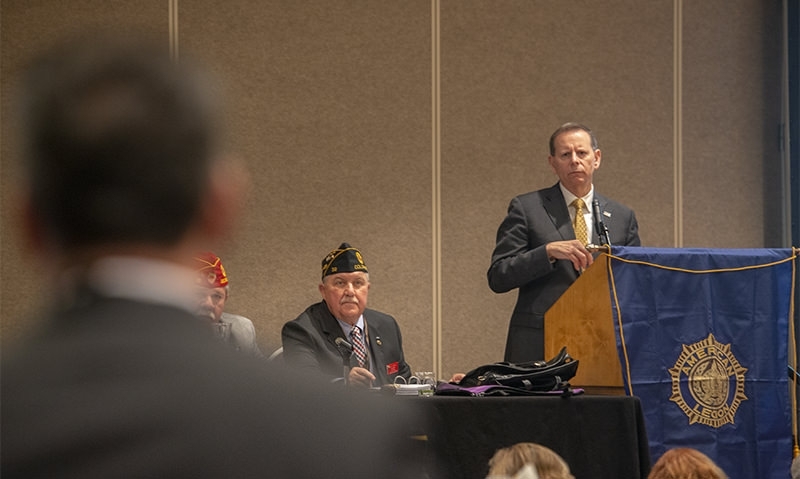
Top executives from health, benefits, appeals and memorial arms of Department of Veterans Affairs brief American Legion National Convention.
The man tasked with leading health-care delivery to the nation’s veterans wants to continue to do so using the system set up specifically to deliver that care: the Department of Veterans Affairs.
Dr. Richard Stone, VA’s executive-in-charge in the Veterans Health Administration, told members of The American Legion’s Veterans Affairs & Rehabilitation Commission on Aug. 25 that if it’s up to him, VA will continue to serve veterans in its current form.
“I’ve no intention of privatizing VA,” he said. “This is a system worth saving. We’re going to get this going in the right direction.”
Restoring trust in VA, which Stone said the department lost in 2014, continues to be his top priority. “We lost your trust because we were too bureaucratic,” he said. “Our care was bad. In the last four years, we’ve worked hard to regain that. But we’re not there yet.
“We’ve had dramatic improvements in the trust of the American people, the trust of America’s veterans, and the trust of America’s elected representatives in us. But we’re not there yet. The No. 1 goal that I have is to restore the trust of each of you in the people of the VA.”
The way to restore trust, Stone said, is to reduce harm to patients – a task VHA has focused on to ensure “that when you come to see us, we are doing the right thing. It’s what we all want to do, and we need to institute those policies and programs that get us there.”
Stone praised The American Legion’s System Worth Saving (SWS) visits and reports, which are based on Legion staff and volunteers visiting VA facilities across the nation to interview both staff and patients to find out what each facility does both well and struggles with while performing its mission.
Stone said the SWS program “is incredibly helpful to us. If I have any appeal to you as you go into your broader work is please continue the System Worth Saving effort. Those visits help us, those reports help us. I find them incredibly valuable from a trusted partner.”
When questioned on the Choice Program, which allows VA patients to get care elsewhere in certain situations and has seen some outside providers struggle to get payment from VA for their services, Stone was very clear. “We can’t restore trust if we don’t pay our bills,” he said. “This is a deeply broken system that, frankly, I’ve been spending daily meetings on to try and move us forward.
“We are woefully behind in paying a number of our bills to our providers, and those veterans need to be referred back into our systems in order for us to be able to work those accounts.”
Dr. Paul Lawrence, Veterans Benefits Administration under secretary, thanked The American Legion for the number of claims its department service officers file on behalf of veterans each year.
Lawrence also listed VBA’s top three priorities:
• Providing veterans with the benefits they have earned in a manner that honors their service.
• Ensure that VBA is a strong fiscal steward of the money entrusted to it.
• Foster a culture of collaboration.
It helps, Lawrence said, that veterans’ issues have become a national issue. “The time is very special for veterans,” he said. “Congress has been very generous with its resources. The focus is on issues we need to get done, and the tools are in place.”
Cheryl Mason, chairman of the Board of Veterans’ Appeals (BVA), said there currently are 400,000 appeals of VA decisions pending, most of which reside with VBA currently. Approximately 150,000 are with the board, which consists of 91 judges and an additional eight judges pending with the VA secretary and White House.
The board has issued 75,000 decisions this year – a record, Mason said. The board is on pace to hit its goal of 81,000 decisions by the end of September. Modernization continues to be a priority for the board, which currently works with 40-year-old technology. A confusing VA appeals system also hinders the effort.
“It takes too long for veterans,” Mason said. “We are losing veterans while they’re waiting, and that’s not acceptable.”
Mason said a partnership with veterans service organizations like The American Legion, which represents veterans with cases at the BVA, is critical. “You all are our voice of veterans, and we need to listen to you,” she said. “It’s very important that we hear you. You represent 75 percent of our veterans.”
Randy Reeves, VA’s under secretary for Memorial Affairs, also praised The American Legion for the presence it has at veterans’ funerals he’s attended. “So many times I go out and see it’s The American Legion that I see providing honor guards and making sure our veterans are honored in the way they should be when they go to their final rest,” he said. “I thank you for that. Without our veterans service organizations, specifically The American Legion, those honors would not be provided.”
- Veterans Healthcare

